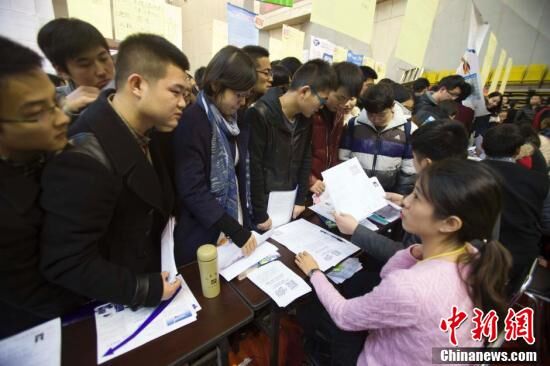


Only 40 percent of China’s post-90s graduates stay in their jobs for longer than two years, according to a newly released report by Mycos Research Institute. The report shows that post-90s workers who obtained their diplomas in 2011 have on average two different employers within a period of three years.
The post-90s generation includes people born between 1990 and 2000. As a group, the generation is seen as quite individualistic compared to earlier generations, and they’ve been assigned a wide variety of attributes and labels, including open-minded, international and confident. These young people tend to look for a job to be interesting, offer room for personal development and provide a suitable working environment, according to another report.
The working post-90s generation chooses personal interests over development opportunities and financial security, a study by China’s leading recruitment website Zhaopin shows.
“In their eyes, working in State-owned enterprises, which usually offer generous work benefits and a stable environment, is not an attractive option anymore,” said Shen Yan, a human resources director at Shougang Group, in an interview with China Youth Daily.
Zhang Yang is one such typical post-90s worker. Zhang, who holds an MA, explained to the China Youth Daily reporter why he quit a job that many people regard as a “golden rice bowl” – a good, reliable prospect. Zhang used to work for a SOE that paid him very well and provided him with opportunities to travel abroad. Nevertheless, Zhang chose to leave the company because the work was “too monotonous.”
“If I had continued the job, every day of the rest of my life would have been the same until my retirement. That would be awful,” Zhang said.
Li Ke, a human resources manager from Wengfu Group in Guizhou, said that job hopping highlights the characteristics of the post-90s generation. Compared to the “team players” born in the ‘60s and ‘70s, millennials tend to focus more on needs of personal development, emotions and fulfillment.

A hashtag, translating roughly to “the post-90s generation quits over any little thing,” has even gone viral on Weibo.
“A large portion of this generation gets strong financial support from family, so [these young people] basically live with no pressure; they do things in their own way, with less professionalism in the workplace,” said Li.
Shen believes that, in addition to personal development, social transformation is also a cause of job hopping among the post-90s generation.
“Adjustments and upgrades to China’s current economic structure bring changes in some companies, and this encourages young people to switch their jobs,” Shen explained.
A hashtag, translating roughly to “the post-90s generation quits over any little thing,” has even gone viral on Weibo. However, many netizens disagree with the idea that job hopping is solely the province of the post-90s generation, and with the belief that this cohort will quit a job over any and every small problem.
Some say the issue originates with companies nowadays rather than their post-90s employees. One theory is that companies squeeze graduates out and offer minimal room for personal development.
 Fire brigade in Shanghai holds group wedding
Fire brigade in Shanghai holds group wedding Tourists enjoy ice sculptures in Datan Town, north China
Tourists enjoy ice sculptures in Datan Town, north China Sunset scenery of Dayan Pagoda in Xi'an
Sunset scenery of Dayan Pagoda in Xi'an Tourists have fun at scenic spot in Nanlong Town, NW China
Tourists have fun at scenic spot in Nanlong Town, NW China Harbin attracts tourists by making best use of ice in winter
Harbin attracts tourists by making best use of ice in winter In pics: FIS Alpine Ski Women's World Cup Slalom
In pics: FIS Alpine Ski Women's World Cup Slalom Black-necked cranes rest at reservoir in Lhunzhub County, Lhasa
Black-necked cranes rest at reservoir in Lhunzhub County, Lhasa China's FAST telescope will be available to foreign scientists in April
China's FAST telescope will be available to foreign scientists in April "She power" plays indispensable role in poverty alleviation
"She power" plays indispensable role in poverty alleviation Top 10 world news events of People's Daily in 2020
Top 10 world news events of People's Daily in 2020 Top 10 China news events of People's Daily in 2020
Top 10 China news events of People's Daily in 2020 Top 10 media buzzwords of 2020
Top 10 media buzzwords of 2020 Year-ender:10 major tourism stories of 2020
Year-ender:10 major tourism stories of 2020 No interference in Venezuelan issues
No interference in Venezuelan issues
 Biz prepares for trade spat
Biz prepares for trade spat
 Broadcasting Continent
Broadcasting Continent Australia wins Chinese CEOs as US loses
Australia wins Chinese CEOs as US loses